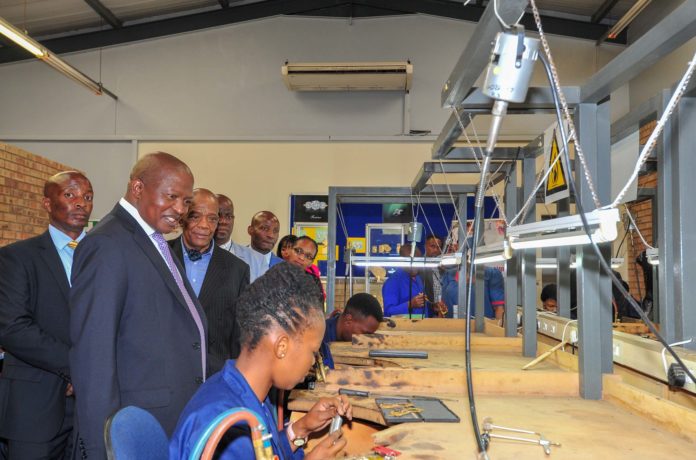Usually conversations around higher education in South Africa are centered on universities. But technical vocational education and training (TVET) colleges are also an important component of our tertiary education landscape. Here’s a crash course on these often overlooked spaces.
So what are TVET colleges?
TVET colleges fall under the department of higher education and training. They focus on “vocational and occupational education and training with (the) aim of preparing students to become functional workers in a skilled trade”. While universities require a bachelor’s pass at matric level, TVET colleges accept students who’ve passed Grade 9, 10, 11 or 12. Some colleges offer up to 300 different courses. These include the National Certificate (Vocational), NATED / Report 191, NQF Full Time and Learnerships.
How many are there in South Africa?
There are currently 50 registered, public TVET colleges, situated all over the country. These operate under the authority of the Continuing Education and Training Act 16 of 2006.
Here’s a full list of the TVET colleges in SA (map)
How does NSFAS funding work for TVET colleges?
The department of higher education offers bursaries available for National Certificate Vocational courses at public TVET Colleges to students who meet the criteria. The National Student Financial Aid Scheme (NSFAS) administers those bursaries. Other bursaries are also available; these vary from college to college.
According to NSFAS, it covers the following with regards to TVET colleges:
• Accommodation in an urban area (R24,000 per annum)
• Transport – up to 40 km from institution (R7,350 per annum)
• Accommodation in an peri-urban area (R18,900 per annum)
• Transport (R7000 per annum)
• Accommodation in an rural area (R15,750 per annum)
• Incidental/personal care allowance (R2900 per annum)
For a TVET college student to qualify for NSFAS funding, they must meet the following requirements.
- Be a South African citizens
• A student must be registered or intending to register on a PLP, NC(V) or Report 191 programme at any of the fifty (50) public TVET Colleges in South Africa;
• Must be in need of financial assistance (NSFAS will determine whether or not a student meets the financial eligibility criteria);
• Returning students must demonstrate proven and accepted academic performance (academically deserving) in line with the College’s progression policy or the progression prescriptions of the Bursary Rules and Guidelines (whichever is higher);
• Must not be enrolling for a qualification that duplicates previous learning that was state-funded; and
• Applicants will qualify if they fall within the maximum threshold of up to R350,000 of combined gross family income per annum and are admitted/received a firm offer for enrolment in a College.
Chatting to The Daily Vox, Nicola Branson, a senior research fellow with the Southern Africa Labour and Development Research Unit (SALDRU), which is based at the University of Cape Town, said students eligible for NSFAS funding can only enrol in NCV and NATED/Report 191 (N1 to N6) courses at TVET colleges. “Therefore, they cannot enroll in any of the occupational courses which have been argued to align better with labour market needs,” Branson said. “Given the restricted program options subsidised by NSFAS, might a student who would have gone to college opt for university instead,” Branson pointed out.
Read more: #FeesCommission report: How TVETs win
How many students are enrolled in TVET colleges?
The number of students enrolled in TVET colleges reached 705 397 in 2016; in the same year, public universities had more than 900 000 students enrolled. Despite a doubling of enrollment at TVET colleges between 2010 and 2016, this growth is still far below the targets stipulated in both the White Paper for PSET and the National Development Plan, a 2019 report noted.
Why don’t SA students go to TVET colleges?
There are many reasons. For one, TVET colleges don’t live up to expectations. The White Paper on Post-School Education and Training calls for “higher education programmes and modes of provision that are responsive to students’ needs and realities and which take into account their varying life and work contexts”. The colleges have been largely unable to meet this standard.
Writing in the Mail and Guardian, Professor Vusi Gumede, dean of the faculty of economics at the University of Mpumalanga said: “Interventions around the technical and vocational education and training (TVET) institutions have not delivered expected results and many young people avoid these TVET institutions.” They do not properly prepare their students for the labour market.
Read more: How campuses are avoiding stampedes after Capricorn TVET
Read more: TVET college students say they aren’t getting their NSFAS transport allowance
Another aspect of students’ disinterest in TVET colleges relates to our country’s history. During the apartheid era, the exclusion of black people from much of the economy meant there were very few qualified black artisans in particular sectors of the economy. Educationist Volker Wedekind highlighted that “right from its earliest incarnation, it was a coercive and exploitative relationship, rather than a benign relationship between a master craftsman and a novice”. This negative connotations around the artisan sector meant people remember how this sort of training was used as a tool for social engineering during apartheid, keeping black South Africans out of certain careers wrote Angelique Wildschut for The Conversation.
Branson worked on a report in 2019 around the labour market. She said the figures show that if the individual is choosing between college and university, then employment and earnings are considerably more favourable for those with a university qualification.









